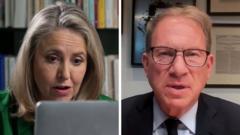The Atlantic editor Jeffrey Goldberg uncovered sensitive military information while mistakenly invited to a Signal chat with senior Trump administration officials. Following his report, he has faced personal attacks from key figures, raising questions about accountability and information security.
Exposed in a Signal Chat: A Journalist's Unexpected Encounter with U.S. Officials

Exposed in a Signal Chat: A Journalist's Unexpected Encounter with U.S. Officials
Jeffrey Goldberg faces backlash from Trump administration after revealing sensitive information shared in a mistakenly inclusive group chat.
In a surprising turn of events, journalist Jeffrey Goldberg, editor of The Atlantic, finds himself at the center of controversy after accidentally being included in a group chat with high-ranking U.S. officials. The situation escalated when Goldberg reported sensitive details about a planned military operation in Yemen that were shared during the conversations intended for a select audience.
Goldberg received the initial message from an account under National Security Advisor Michael Waltz's name through Signal, an encrypted messaging app favored by journalists and government officials alike. Assuming it was a prank, he joined the chat only to witness discussions among key figures, including Secretary of State Marco Rubio, Secretary of Defense Pete Hegseth, and CIA Director John Ratcliffe. Their communications contained sensitive operational details about an upcoming airstrike on Houthi rebel targets.
In an BBC interview, Goldberg reflected on how this unusual situation unfolded. He initially dismissed the message as a hoax but soon found himself privy to discussions that he now considers highly sensitive. After Waltz publicly took responsibility for the mistake, claiming he did not mean to include Goldberg, the fallout began. Trump and other administration officials labeled Goldberg a “sleazebag” and challenged his credibility regarding the shared information.
Although Goldberg withheld certain sensitive details in his initial report, he eventually published the full texts of the conversations, which included specific timings and military strategies. In response to claims from administration officials that the shared information was not classified, Goldberg asserted that details regarding military operations certainly qualify as sensitive data.
This incident is not the first time Goldberg has faced repercussions from the Trump administration. Previously, he reported on Trump disparaging fallen American soldiers, drawing the president’s ire once more. Discussing the hostile reaction he has received since this recent leak, Goldberg remarked, "This is their move. You never defend, just attack."
Despite the backlash, the repercussions of this incident appear to be widening, with calls from both Democratic and some Republican lawmakers for an investigation. Goldberg noted a striking disparity in potential consequences for rank-and-file military personnel versus high-ranking officials within the administration when it comes to handling sensitive information. After the leak, Goldberg opted to exit the group chat—suggesting that while he was granted an unexpected window into high-stakes national security discussions, maintaining journalistic integrity was paramount to him.
As the dust settles, this incident invites important dialogue on accountability within government ranks and raises fundamental questions about how sensitive information is managed in the digital age.





















